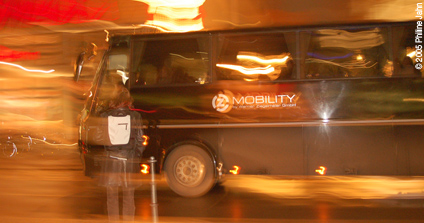Volume 2: Foreword

TRANSIT‘s second issue—Translation and Mobility—explores the spatial movement and linguistic mobility inherent in translation. The articles that comprise this second issue engage the topics of translation and mobility in a number of ways, with two themes emerging as the central areas of inquiry.
The first set of questions center around linguistic mobility versus spatial mobility. Christina Kraenzle argues that Yoko Tawada draws attention to a new model of travel in her novel Überseezungen. At this model’s core is the notion that movement across geographical regions is no longer experienced as a physical movement through space; movement is experienced linguistically, upon arrival at one’s destination. Kraenzle’s paper reveals Tawada’s interpretation of language as a new geography. David D. Kim, like Kraenzle, views translation as both a linguistic and physical/spatial phenomenon. His analysis of Peter Altenberg’s Ashantee demonstrates how the poetics of a “loving translation” may subvert and transform the physical and spatial constructs of colonialism. He thus calls for a critical approach that accounts for the possibility and potential of a subversive poetics in texts that may otherwise perpetuate hierarchical colonial relationships.
Jeroen Dewulf’s article, on the other hand, thematizes translation less on a linguistic level and more on an experiential level. He examines three counter-narratives to Gottfried Keller’s idealized representation of return to the homeland, and highlights how personal mobility can problematize the relation to one’s origins. In the same vein, Kathleen Sclafani discusses the Andreas Dresen’s film Halbe Treppe as a text which invites a reimagining of identity through the mobility and translation of characters across political and, more importantly, domestic borders. Katrin Pahl takes a close look at another film, titled Copy me—I want to travel. Her focus is on the shift in mobility made through the advent of computing and the ways that computing and programming code have been mobilized as strategies of resistance to heteronormativity and labor migration.
The second group of papers draw out the asymmetry of translation. Emily Apter’s article offers critical insight into the asymmetrical status of translation and the translator in the global war on terror. She writes about the judicial scandal surrounding the conviction of the professional translator and graduate student at NYU, Mohammed Yousry, showing that translators occupy an increasingly dangerous position in the post-9/11 world. She pleads for an “English Plus” movement that might thwart the drive to monolingualization, cultural isolationism, and political unilateralism characteristic of current policies of the United States. Denise Varney, on the other hand, discusses the asymmetry of translation through the lens of transnational subjects that arise in theatrical works by Anna Langhoff, Christoph Schlingensief, and Heiner Müller. She reads their plays as intensifications of the processes of integration in post-communist, western European societies. She argues that by placing transnational subjectivities on a national stage, modern theater challenges the way in which liberal social democracies address migration in times of increasing European and global inequality.
Less confined to these two main categories of questioning, Graham Parkes’ clip from his video essay, “Walter Benjamin’s Paris,” engages Benjamin’s treatment of the flâneur in his Passagenwerk, blending image, movement, music, and text in a celebration of Benjamin’s work. In addition, Boris Previsic performs a formal analysis of poetic meter and rhythm in Hölderlin’s translations, giving insight into Hölderlin’s later work.
Leslie A. Adelson’s English translation of Emine Sevgi Özdamar’s short story Der Hof im Spiegel crowns the articles in the special topic. Adelson’s translation brings across the intensity of Özdamar’s text for the English-speaking world and instantiates a moment of cultural transfer to highlight the special topic of this year’s issue.
Rounding out the issue are Jakob Starzinger’s article in the Open Forum and two book reviews by Steve Choe and Christina Gerhardt.1
It has been a very productive year for TRANSIT. Mid-year we announced our International Advisory Board, which can be viewed on this website and consists of renowned scholars in the fields of German, Film Studies, History, Literature, and other disciplines. TRANSIT is indexed in the MLA International Bibliography as a refereed journal.
On a final note, this is my last issue as managing editor. It has been an incredible experience working with the TRANSIT team and the authors. I wish the next managing editors, Steve Choe and Gabe Trop, all the best with the 2007 issue and the special topic of “Music and Communities.” I hope you find this issue as engaging to read as it was to put together.
Jennifer Zahrt
Managing Editor
Berkeley, December 22, 2006
- Submissions for the Open Forum and book reviews are considered for publication at any time. ↩︎
